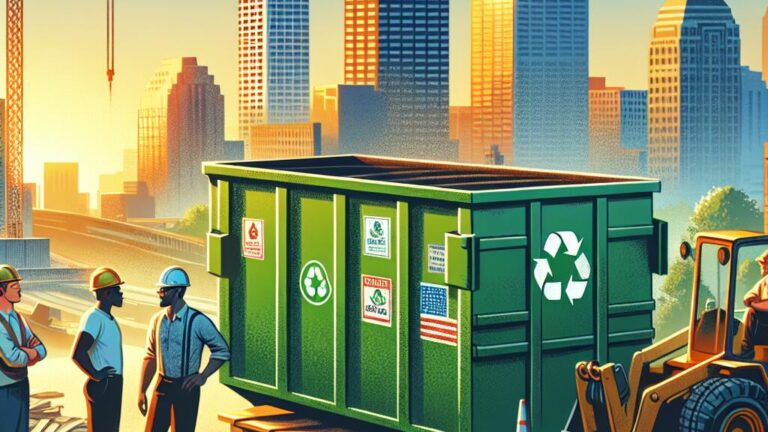Why You Should Consider Renting a Commercial Dumpster
Compliance with Local Regulations
Adherence to local regulations is crucial for businesses managing waste. Various municipalities have specific guidelines regarding waste disposal, including the types of materials that can be discarded and the methods of collection. Ignoring these regulations can result in hefty fines and legal complications. By renting a commercial dumpster, businesses ensure compliance with these rules, minimizing the risk of penalties.
Renting from a reputable provider also helps in staying informed about local requirements. Many dumpster rental companies offer guidance on what can and cannot be disposed of in their containers. This additional support is particularly beneficial for new business owners or those unfamiliar with waste management practices. By understanding and following these regulations, companies can maintain both a clean environment and their operational integrity.
Understanding Waste Disposal Laws
Waste disposal laws vary widely by location and can significantly impact how businesses manage their waste. These regulations are designed to protect public health and environmental quality. Violating local laws can lead to hefty fines and damage to a company’s reputation. Familiarizing oneself with these regulations is essential for any business that generates a considerable amount of waste.
Many municipalities have specific guidelines on the types of materials that can be discarded, as well as the proper handling and disposal methods. Certain items, like hazardous waste, require special permits and procedures. Adhering to these laws not only ensures compliance but also promotes responsible corporate citizenship. Understanding the legal landscape around waste disposal can be beneficial in aligning business practices with environmental sustainability goals.
Types of Waste Suitable for Commercial Dumpsters
Commercial dumpsters are versatile containers designed to accommodate a wide range of waste materials generated by various industries. Common types of waste suitable for these dumpsters include construction debris, such as wood, drywall, metals, and concrete. Businesses in the renovation and construction sectors often need to dispose of large amounts of material quickly to maintain efficiency on job sites. Additionally, commercial dumpsters can handle bulky items like furniture and appliances during office cleanouts or relocations.
Other materials that can be disposed of in commercial dumpsters include non-hazardous industrial waste, yard waste, and general household junk. Retail establishments frequently utilize dumpsters to manage excess inventory and packaging materials, streamlining their waste management processes. Properly sorting waste materials before disposal maximizes recycling opportunities and minimizes landfill contributions. By understanding the types of waste appropriate for commercial dumpsters, businesses can enhance their operational efficiency while adhering to environmental responsibilities.
Identifying Acceptable Materials
When considering a commercial dumpster rental, it’s essential to be aware of the types of waste that can be disposed of legally. Common items accepted in dumpster rentals include general construction debris, packaging materials, and non-hazardous household waste. Each dumpster type has specific guidelines concerning the materials allowed, which may vary depending on local regulations and the waste management company’s policies. Familiarizing yourself with these guidelines helps in preventing additional fees or complications during disposal.
Certain materials often have restrictions due to safety and environmental concerns. Hazardous waste, electronics, and appliances typically require special handling and cannot be discarded in standard commercial dumpsters. Additionally, organic waste and yard debris may not be accepted by all rental services. Understanding these distinctions is vital for ensuring compliance while maximizing the efficiency of waste disposal during your project.
The Rental Process Explained
Securing a commercial dumpster rental involves a few straightforward steps. Start by assessing the size and type of dumpster needed based on the volume and kind of waste generated. Many rental companies provide guides or assistance to help determine the appropriate dumpster size. Once you have that information, contact local rental services to inquire about availability, pricing, and any additional fees.
After selecting a rental company, the next step is to confirm delivery logistics. This may include scheduling a drop-off time and determining the ideal placement location. It’s essential to ensure there is ample space for the dumpster and that it doesn’t obstruct access or violate local regulations. Review the rental contract carefully to understand the terms and conditions, ensuring clarity on pickup times and potential overage charges.
Steps to Secure a Dumpster Rental
The first step in securing a dumpster rental involves assessing your specific needs based on the volume and type of waste you expect to generate. Consider factors such as the size of the dumpster, the duration of the rental, and any local regulations regarding placement, which can influence your choice. Gathering this information will enable you to communicate effectively with potential rental companies.
Once you have a clear understanding of your requirements, reach out to several dumpster rental providers to compare pricing and availability. Be prepared to provide details about your project, including the types of materials you plan to dispose of and the timeline for the rental. Many companies can offer guidance on the appropriate size and type of dumpster for your needs, ensuring a smooth process for waste disposal.
Frequently Chosen Industries for Dumpster Rentals
Several industries often rely on commercial dumpster rentals to efficiently manage their waste. Construction and renovation projects generate substantial debris, making these rentals essential for maintaining a clean and safe worksite. Restaurants and food services also benefit significantly, as they can dispose of organic waste and packaging materials conveniently.
Retail businesses frequently experience large volumes of cardboard and other recyclable materials, necessitating the use of dumpsters to streamline their waste management processes. Additionally, events and festivals create temporary but considerable waste, prompting organizers to secure rentals for effective disposal. In each case, commercial dumpster rentals provide a practical solution tailored to the specific waste needs of various sectors.
Common Sectors That Benefit from Rentals
Many industries find dumpster rentals essential for efficient waste management. Construction companies often deal with large amounts of debris and materials that need to be disposed of quickly. Their projects generate various waste types, including concrete, wood, and metal. A commercial dumpster provides a convenient solution for collecting and managing this waste, ensuring the site remains organized and safe.
Retail and hospitality sectors also benefit significantly from dumpster rentals. These businesses accumulate substantial amounts of packaging materials and refuse that require regular disposal. Renting a dumpster allows them to maintain a clean environment and comply with waste disposal regulations. Additionally, healthcare facilities produce medical waste that demands special handling, making commercial dumpsters vital for proper containment and disposal.
FAQS
What are the benefits of renting a commercial dumpster?
Renting a commercial dumpster provides several benefits, including compliance with local waste disposal regulations, efficient waste management, cost-effectiveness, and convenience for businesses generating large amounts of waste.
What types of waste can be disposed of in a commercial dumpster?
Commercial dumpsters are designed to handle a variety of waste materials, including construction debris, office waste, industrial waste, and certain types of hazardous materials—depending on local regulations. It’s essential to check with your rental provider for specific materials allowed.
How can I ensure compliance with local regulations when renting a dumpster?
To ensure compliance, familiarize yourself with local waste disposal laws and regulations by contacting your local waste management authority. Additionally, work with a reputable dumpster rental company that can guide you on the legal requirements for waste disposal in your area.
What is the typical process for renting a commercial dumpster?
The typical process for renting a commercial dumpster includes identifying your waste disposal needs, selecting the appropriate dumpster size, contacting a rental provider for a quote, scheduling delivery, and arranging for pickup once the dumpster is full.
Which industries commonly utilize commercial dumpster rentals?
Many industries utilize commercial dumpster rentals, including construction, manufacturing, retail, hospitality, and healthcare. These sectors often generate substantial waste and benefit from the efficiency and convenience of having a dedicated waste disposal solution.







